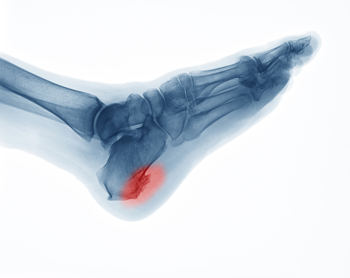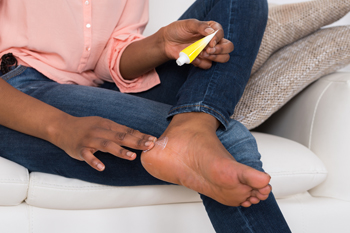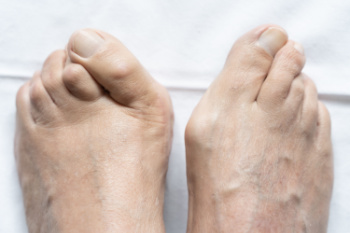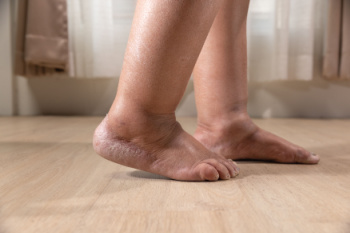NJ (908) 688-5577
NY (212) 737-2528

A heel spur is a bony growth that forms on the heel bone, typically at the point where the plantar fascia connects to the heel. It is often caused by repetitive strain or stress on the foot, which leads to inflammation in the surrounding tissues. Common causes include activities that involve excessive walking, running, or standing, especially on hard surfaces. People with flat feet or high arches are also more susceptible to developing heel spurs. Symptoms of a heel spur include sharp pain or discomfort at the bottom of the heel, particularly when standing up or walking after long periods of rest. The pain may decrease as the foot warms up but can return after prolonged activity. If you have heel pain, it is suggested that you consult a podiatrist who can accurately diagnose and treat what may be going on.
Heel spurs can be incredibly painful and sometimes may make you unable to participate in physical activities. To get medical care for your heel spurs, contact Glenn Davison, DPM from Advanced Podiatry. Our doctor will do everything possible to treat your condition.
Heels Spurs
Heel spurs are formed by calcium deposits on the back of the foot where the heel is. This can also be caused by small fragments of bone breaking off one section of the foot, attaching onto the back of the foot. Heel spurs can also be bone growth on the back of the foot and may grow in the direction of the arch of the foot.
Older individuals usually suffer from heel spurs and pain sometimes intensifies with age. One of the main condition's spurs are related to is plantar fasciitis.
Pain
The pain associated with spurs is often because of weight placed on the feet. When someone is walking, their entire weight is concentrated on the feet. Bone spurs then have the tendency to affect other bones and tissues around the foot. As the pain continues, the feet will become tender and sensitive over time.
Treatments
There are many ways to treat heel spurs. If one is suffering from heel spurs in conjunction with pain, there are several methods for healing. Medication, surgery, and herbal care are some options.
If you have any questions feel free to contact our offices located in Union, NJ and New York . We offer the latest in diagnostic and treatment technology to meet your needs.

Cracked heels develop when the skin on the heels becomes dry and thick, leading to fissures that can deepen over time. People with diabetes, hypothyroidism, psoriasis, or allergic dermatitis may be more likely to experience heel fissures. Factors like standing for long periods, being overweight, or wearing open-back shoes can contribute to the problem by increasing pressure on the heels. Initially, a dry, hardened callus forms around the edge of the heel, often appearing yellow or dark brown. Without treatment, small cracks can widen, becoming painful and even bleeding. In severe cases, cracked heels can lead to severe infections like cellulitis, which require immediate medical attention. People with diabetes should be especially cautious, as deep heel cracks may result in foot ulcers. A podiatrist can remove thickened skin, prescribe medication for infections, and provide supportive footwear advice to prevent further complications. If you have cracked heels that have become painful or infected, it is suggested that you schedule an appointment with a podiatrist for an exam and treatment options.
If the skin on your feet starts to crack, you may want to see a podiatrist to find treatment. If you have any concerns, contact Glenn Davison, DPM from Advanced Podiatry. Our doctor can provide the care you need to keep you pain-free and on your feet.
Cracked Heels
It is important to moisturize your cracked heels in order to prevent pain, bleeding, and infection. The reason cracked heels form is because the skin on the foot is too dry to support the immense pressure placed on them. When the foot expands, the dry skin on the foot begins to split.
Ways to Help Heal Them
Ways to Prevent Cracked Heels
If you are unsure how to proceed in treating cracked heels, seek guidance from a podiatrist. Your doctor will help you with any questions or information you may need.
If you have any questions, please feel free to contact our offices located in Union, NJ and New York . We offer the newest diagnostic and treatment technologies for all your foot care needs.

A bunion is a bony bump that forms at the base of the big toe when the joint becomes misaligned. This occurs when the big toe gradually shifts toward the other toes, causing the joint to stick out. Bunions develop due to factors such as genetics, wearing improper footwear, flat feet, or arthritis. Even after treatment, they can return if the underlying causes are not addressed. Wearing tight or narrow shoes continues to place pressure on the joint, leading to recurrence. Weak foot muscles or improper walking mechanics may also contribute to the problem. Maintaining proper footwear, using orthotics, and strengthening foot muscles can help prevent bunions from coming back. If discomfort persists, it is suggested that you consult a podiatrist who can correct the alignment and relieve symptoms.
If you are suffering from bunions, contact Glenn Davison, DPM of Advanced Podiatry. Our doctor can provide the care you need to keep you pain-free and on your feet.
What Is a Bunion?
A bunion is formed of swollen tissue or an enlargement of boney growth, usually located at the base joint of the toe that connects to the foot. The swelling occurs due to the bones in the big toe shifting inward, which impacts the other toes of the foot. This causes the area around the base of the big toe to become inflamed and painful.
Why Do Bunions Form?
Genetics – Susceptibility to bunions are often hereditary
Stress on the feet – Poorly fitted and uncomfortable footwear that places stress on feet, such as heels, can worsen existing bunions
How Are Bunions Diagnosed?
Doctors often perform two tests – blood tests and x-rays – when trying to diagnose bunions, especially in the early stages of development. Blood tests help determine if the foot pain is being caused by something else, such as arthritis, while x-rays provide a clear picture of your bone structure to your doctor.
How Are Bunions Treated?
If you have any questions, please feel free to contact our offices located in Union, NJ and New York . We offer the newest diagnostic and treatment technologies for all your foot care needs.

Swollen feet are a common issue and can occur due to various reasons, often related to lifestyle or underlying health conditions. One of the primary causes is standing or sitting for long periods, as this can prevent proper circulation and cause fluid to accumulate in the feet. Consuming too much salt can also contribute to swelling, as excess sodium causes the body to retain more water. Pregnancy is another common cause, as the body undergoes significant changes, leading to increased fluid retention and pressure on the veins in the legs. Injuries, such as sprains or fractures, can also cause localized swelling as the body responds to inflammation. Being overweight puts added pressure on the feet, which can strain the circulation system and lead to swelling. If you have swollen feet, it is suggested that you consult a podiatrist who can determine what the cause is, and offer effective relief tips.
Swollen feet can be a sign of an underlying condition. If you have any concerns, contact Glenn Davison, DPM of Advanced Podiatry. Our doctor can provide the care you need to keep you pain-free and on your feet.
Swollen feet are a common ailment among pregnant women and people who stand or sit for extended periods. Aging may increase the possibility of swollen feet and patients who are obese often notice when their feet are swelling too. There may be medical reasons why swollen feet occur:
Swollen feet can also be caused by bone and tendon conditions, including fractures, arthritis, and tendinitis. Additionally, there may be skin and toenail conditions and an infection may cause the feet to swell. Patients who take medicine to treat high blood pressure may be prone to getting swollen feet.
Many patients elevate their feet to help relieve the swelling and this is generally a temporary remedy. When a podiatrist is consulted the reason behind the swelling can be uncovered and subsequently treated.
If you have any questions please feel free to contact our offices located in Union, NJ and New York . We offer the newest diagnostic tools and technology to treat your foot and ankle needs.